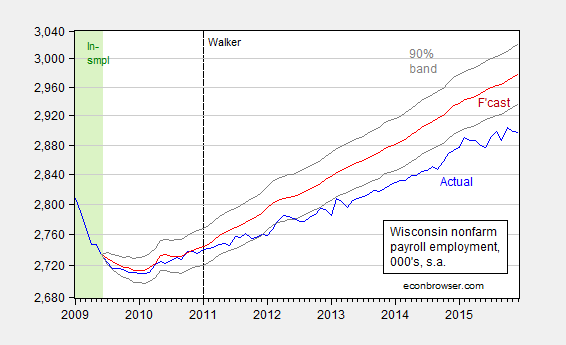The Bureau of Economic Analysis announced today that U.S. real GDP grew at a 0.7% annual rate in the fourth quarter. That’s a bad quarter to be sure, and real GDP is up only 1.8% from a year ago. That’s a weak year judged by the U.S. postwar average of 3.1%, but is not far from the 2.1% annual growth we’ve been averaging since 2009:Q3.
Continue reading
Monthly Archives: January 2016
Wisconsin Governor Walker: “The state of our state is strong!”
That’s the first line of an op-ed published Monday. In other news, Wisconsin nonfarm payroll employment (NFP) and private nonfarm payroll employment is decreasing. And NFP lagging what should be the case if the historical correlation between national and Wisconsin employment held, after Governor Walker’s inauguration.
Figure 1: Wisconsin nonfarm payroll employment (blue), forecast from error correction model estimated over 1990M03-2009M06 (red), and 90% confidence band (gray lines), all on log scale. Dashed line at 2011M01 when Walker takes office, and light green denotes sample period. Source: BLS, author’s estimates (as described here).
Guest Contribution: “Asset Valuations and Recession Risks”
We are fortunate to present today a Guest Contribution written by John Kitchen (U.S. Treasury). Any views or opinions expressed are solely those of the author and not of the Treasury Department or any other institution.
With the recent declines in valuations in financial markets, an analysis based on “Relative Valuations of Fixed Capital and Financial Assets in the United States” indicates that we are in a “gray area” regarding the signaling of a heightened risk of recession.
Can lower oil prices cause a recession?
Donald Luskin writes in the Wall Street Journal:
The global economy is slipping into recession. The evidence is showing up in all the usual ways: slowing output growth, slumping purchasing-manager indexes, widening credit spreads, declining corporate earnings, falling inflation expectations, receding capital investment and rising inventories. But this is a most unusual recession– the first one ever caused by falling oil prices.
Three Random Graphs: Recession Watch, Wisconsin Employment Decline, Global Temperatures
Industrial production is down. Wisconsin nonfarm payroll employment is down. Global Temperatures hit records in 2014, 2015.
Guest Contribution: “China’s Slowdown”
Today we are fortunate to have a guest contribution written by Jeffrey Frankel, Harpel Professor of Capital Formation and Growth at Harvard University, and former Member of the Council of Economic Advisers, 1997-99. An earlier version was published by Project Syndicate.
Continue reading
Let’s Stipulate: Some Regulations Are Good
One GOP senator says restaurant workers shouldn’t be required to wash hands after going to the toilet.
The RMB’s Future: Four Views
At the last ASSA meetings in San Francisco, I participated in a Society for the Study of Emerging Markets panel entitled “Can the Chinese Renminbi Rule?: If So, How and When?”
Governor Walker: “There are more people working in Wisconsin than at nearly any other point in our history…”
Where are the factcheckers when you need them?
Employment and GDP Growth
Yesterday’s NYT noted “U.S. Growth and Employment Data Tell Different Stories”:
Measured by traditional yardsticks for growth, like gross domestic product, the American economy definitely looks weak. View it through the prism of hiring and employment, however, and the economy seems surprisingly strong.
